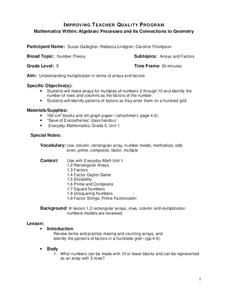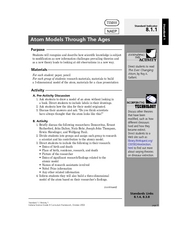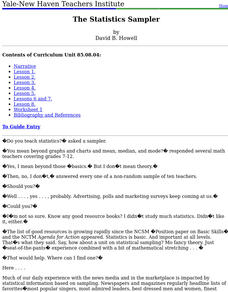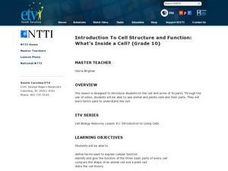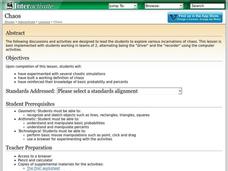Curated OER
Teaching about Increased Conductivity: Are Culverts The Culprits?
Students encounter the complexity of identifying the cause of unusual variations in WOW conductivity data. They propose theories on why there was a sudden increase in conductivity in Ice Lake, Minnesota during July of 1998.
Curated OER
Mathematics Within: Algebraic Processes and Its Connections to Geometry
Fifth graders discover the connections between algebra and geometry. With a focus on arrays and factors, they are introduced to multiplication. They develop an array for multiples of 2 through 10 and identify the factors of each row....
Curated OER
Gender Disparity on Display
Students explore an article and discuss what gender differences. In this exploring gender lesson students divide into groups and develop a social theory.
Curated OER
Exploring Pascal's Triangle and Other Recursive Patterns
Students explore patterns in everyday life and in the mathematic world. They create various concrete examples of patterns and verbally describe these patterns to a fellow student.
Curated OER
Paint My Counties: Map Coloring the Counties of Arizona
Fourth graders identify the counties of Arizona. In this social studies lesson, 4th graders color a county map of Arizona using the fewest number of colors possible. Students write a persuasive paragraph.
Curated OER
Fractions in the Kitchen
Seventh graders use the World Wide Web for research, identify fractions found in everyday life by finding a recipe that uses fractions.
Curated OER
Basketball Calculating Percentage
Seventh graders calculate percentages, convert fractions to decimals, and decimals to fractions using information from a basketball game.
Pennsylvania Department of Education
Associative Properties
Students investigate the associative property of addition. In this associative property of addition lesson, students work in pairs and build addition problems with six blocks. They sit on either side of a desk so that they can "read" the...
Curated OER
Atom Models Through the Ages
Eighth graders explain the development of the atomic model over time. In this chemistry instructional activity, 8th graders research about the scientists who made a contribution to the atomic theory. They create a three-dimensional model...
Curated OER
Compare Human-made Objects with Natural Objects
Learners examine and observe how many human-made objects get their basic design from things in nature. They listen to the book "Nature Got There First," compare/contrast hollow bones with drinking straws, bird beaks and tool pliers, and...
Curated OER
Changes in the Community: Diversity of Learners Adaptation
Students determine the rate of travel through Ohio based on mode of transportation: walking, horse bak riding, railroad, and car. They are asked to write a sentence explaining how they would determine how long each trip takes. Students...
Curated OER
Natural Selection I
Eighth graders list the steps of Darwin's natural selection. They demonstrate the process of natural selection in a predation activity. Students create paper origami frogs to race across the floor and analyze the differences in the...
Curated OER
The Statistics Sampler
Students define sample, describe a random sample, and discuss what compromises a sample. They determine a sample size to estimate a population characteristic with confidence.
Curated OER
Making Hypotheses
Fourth graders practice making hypotheses about what they believe occur as they perform an osmosis experiment in class. This experiment is designed to illustrate how important it is to make an accurate hypothesis.
Curated OER
The Fractal Coast
Students investigate measuring as it relates to the real world. In this geometry lesson plan, students measure distances as they discuss fractals and how it relates to measuring. They measure both linear and non-linear distances.
Curated OER
Fibonacci I
Fifth graders have the opportunity to gather information themselves on Fibonacci and on the occurrence of Fibonacci numbers in nature. They divide up into groups of 2 to 4 to research.
Curated OER
Probability and Statistics
Students reason mathematically as they solve problems dealing with probability of an even occurring. In this probability lesson, students differentiate between different rankings of candidates running for leadership. They identify...
Curated OER
Introduction To Cell Structure and Function: What's Inside a Cell?
Tenth graders are introduced to the cell and some of its parts. Through the use of video, 10th graders see animal and plants cells and their parts. They learn terms used to explain the cell.
Curated OER
Applied Maximum Minimum Problems--Mini Golf
Twelfth graders investigate maximum and minimum as it relates to billiard and mini golf. In this calculus instructional activity, 12th graders review how to find the maximum and minimum and write proofs to show how they arrive at their...
Curated OER
What Is It?
Students explore the likelihood of events. For this logical thinking lesson, 3rd graders are given several scenarios and determine whether the possibility of the described event actually happening is likely, unlikely, or...
Curated OER
Enumeration
In this calculus lesson, students review counting using the principles of Enumeration. They use random selections to count and convert word problems and count. There are 21 problems with an answer key.
Curated OER
Chaos
Students explore the concept of probability. In this probability lesson, students use a applet that demonstrates chaos and probability of spread for a forest fire. Students also play applets about the Game of Life and Rabbits and Wolves,...
Curated OER
Stellar Observations
Ninth graders study the uses of spectroscopy and the operation of the Hubble space telescope. In this astronomy lesson students complete a lab activity that includes graphing star color and temperature.
Curated OER
More of Carrie's Cubes
Learners solve a word problem that explores the shape of a cube and ways that part of it can be colored. They discuss the problem and analyze a Rubik's cube, explore the problem using a graph, and discuss the solutions as a class.



